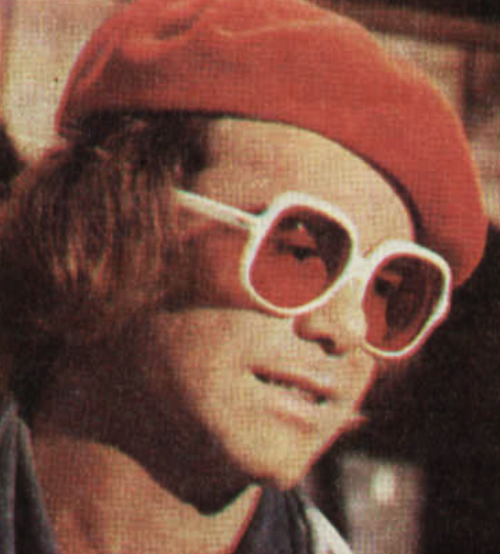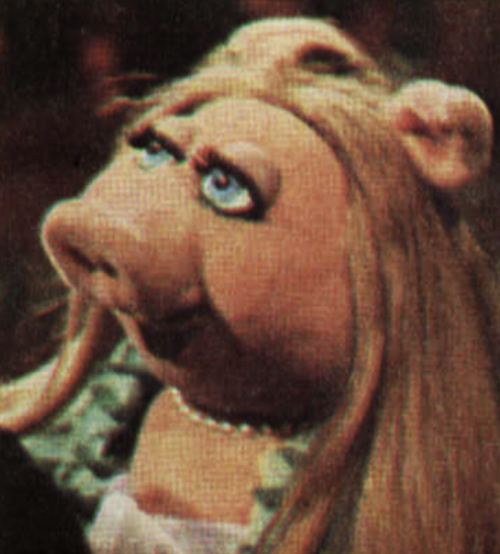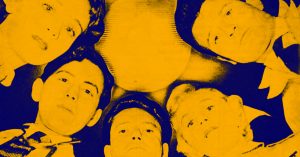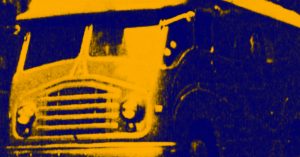Where were Elton and Miss Piggy when the lights went out?
Elton John gives an interview to TVTimes to coincide with his appearance on The Muppet Show in 1977

IT was a black day for Elton John when he went to meet the Muppcts. He was due at ATV’s Borehamwood studios in Hertfordshire for two days of recording for this week’s The Muppet Show, but the dates coincided with the recent power workers’ dispute — and on the first day work had to stop early.

For the amorous Muppet Miss Piggy, with whom Elton was to perform a duet, it was back not to the dressing room but the store cupboard.
For Elton, who takes his chairmanship of Watford Football Club seriously, it was an opportunity to race off to see his team in action. He hired a helicopter for £200, then had to prevail on the police to escort him from Birmingham Airport to West Bromwich Albion football ground. He arrived minutes before the 7.30p.m. kick-off only to see Watford lose 3-2 — the first time he’d seen his team defeated.
The following day Elton was prickly, but politely so. During a brief break in recording, his newly-transplanted pate was bent over a pile of autograph books. Later, once the show was in the can and the studio empty of fans, he was all smiles.
After a phenomenal six years with earnings estimated at £7 million a year — roughly half that figure from royalties alone — he came off the road at the end of 1976. He still insists it’s for good — an insistence reinforced by the announcement that his charity appearance at Wembley last November was his last live show, marking his retirement from the stage altogether.
“It was just a matter of finding the right time,” he said, looking down at what were for him conservatively styled boots. “I don’t regret those years but now I’m rid of them I’m relieved to be starting my life all over. I don’t think anything I’ve written so far is really of much consequence. And I know I can write something of great consequence.”
Until he decided to take a breather he’d enjoyed playing big stadiums surrounded by a seemingly limidess sea of faces. “But quite suddenly I got fed up with seeing people’s faces squashed against fences. I thought, ‘Well, this might be great for me but is it so great for them?’ It wasn’t normal. I had to stop. Re-think.
“When I’ve been on tour I’ve always had bodyguards with me because there was always some crank who wanted to beat me up or shoot me. I went from plane to hotel. From hotel to plane. I tried keeping in touch with everything going on in the world but whatever I did I felt more and more remote.
“I lost my sense of values. I didn’t appreciate what people did for me, nor did I have any idea of how much pleasure just a small thought gives to people. I even resented people wanting my autograph because I’d forgotten what it was like to be on the other side of the fence. The more the wheel turned the more dangerous it felt. So to give up wasn’t a hard decision. It was a gut feeling and I’ve always relied on my instincts.”


His self-assessment docs him no favours. He is after all the man who in 1975 chartered a jet because he thought it would be a nice idea to fly all his office staff, their relatives and friends out to Los Angeles for a corporate jaunt. The gesture is typical of him. As was his refusal to sign up with Rocket, his own record company, until 1976 — four years after it was formed — when he felt it had proved itself.
Elton John hasn’t, and won’t join the ranks of tax exiles, although he is indebted to America for his overnight success story which began in 1970. He does, however, have a home in Beverley Hills.
In all he didn’t spend more than eight weeks in the States last year. There was a six-week holiday, his appearances in Madison Square Garden, another to launch his album The Greatest Hits Vol II and a book called It’s A Little Bit Funny — a photographic collection by David Nutter of Elton’s unguarded moments, with text written by lyricist Bernie Taupin. There were also four days spent recording in Seattle with pianist and ex-Stylistics producer Thom Bell. This session produced six “blatantly pop, blatantly black” tracks for his spring album and a single due for release this month which will be his first new one since Blue Moves on the Rocket label 14 months ago.
Once he was out of the goldfish bowl Elton’s great “down-to-earther” was Watford Football Club. “I was dealing on a normal basis with normal people again. There are still things that I miss, like going for walks or getting on buses. I’d get paranoid thinking everyone was looking and pointing at me. I love the smell of buses. Watford’s been my equivalent of getting on a bus — and sitting in the front seat.”
As a boy they’d been his local team. When he heard they were falling on hard times in 1974 he went along, thinking they’d be put off by his pink hair and eight-inch platform shoes, and offered to do a benefit concert for the club at their ground. About 26,000 people came and they raised £20,000. He became a director, never thinking he’d become chairman, and now football — or rather Watford — is his passion. “Either it’s that,” he laughed, “or it’s being able to tell all my friends that I’m chairman of a football club.”

Another of Elton’s preoccupations this year has been getting Goaldiggers, this country’s only football charity, off the ground. So far he, Jimmy Hill, Brian Moore, Brian Mears and Eric Morecambe under the patronage of the Duke of Edinburgh, have raised enough money to build 20 or so floodlit all-purpose-surface pitches for youngsters in under-privileged areas. The proceeds of his Wembley concert last November went to the Goaldiggers.
Underneath the glossy veneer of the superstar lifestyle and his personal joky image, Elton John has always seemed pretty ordinary, shy and surprisingly insecure. Somewhere there’s a component, a facility for success, everyone’s missed. When he came off the road the Elton ego and image collapsed temporarily. He lost interest in the way he looked, ate too much, drank too much. When he appointed Graham Taylor manager of Watford all that changed, he said, because he recognised something of his old self in Taylor’s dynamic determination, and he wanted to keep pace with him.
“There are two things I could have done,” he said. “I could either have shut myself away, become thoroughly miserable and ruined myself in the process but I realised how ridiculous it was to become a recluse.
“The only other thing I could do was to cope and come to terms with my success. After all I created it.”
About the author
Valerie Clarke wrote for the TVTimes



